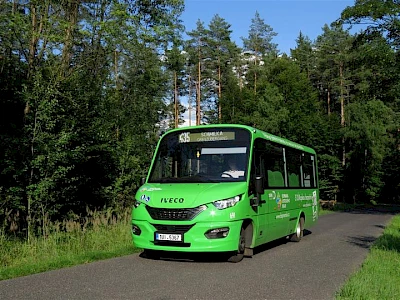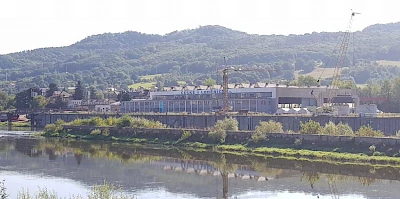Weekly review no. 22
01.03.2024
With direct bus from Schmilka to Prebischtor

With the start of the excursion season, the transport connection from Saxony to Bohemian Switzerland is improving. The new bus route 435 will run every hour on weekends and public holidays from Schmilka, parking lot via Hřensko, Mezní Louka to Mezná. It also stops at the Tři prameny stop, where the footpath to Pravčická brána begins.
Line 435 already existed. The course has changed. She also travels much more frequently on an hourly basis. It begins operations on Good Friday (March 29th) and runs all year round until November 3rd. In the two summer months of July and August the bus even runs daily.
For tourists from Saxony there are two boarding options: one in Schmilka and one in Hřensko, where the ferry takes you from the Schöna S-Bahn station. What the exact connections will be remains to be seen, as the timetable will not be approved by the Ústí District Council until March 20th. “A connection to the S-Bahn and the ferry was not primarily our issue,” says Magdalena Fraňková, spokeswoman for the Ústí district. “In connection with line 438, which comes from Děčín and also goes to Mezná with a half-hour delay, there is an interesting half-hourly service from Hřensko to Mezná,” Fraňková continued.
The 435 buses also stop near the Schöna ferry, which makes it easier to change. In addition, the version of the timetable that has yet to be approved provides a transfer option to line 434 at the next stop Hřensko střed (Center), with which you can continue to Jetřichovice (Dittersbach) and Krásná Lípa (Schönlinde). Buses 438 continue to stop at Hřensko, nábřeží.
Despite starting in Schmilka, the 435 will run entirely under the Czech DÚK tariff (Ustí District Transport Association), so that no cross-border tariff will apply. This makes the connection interesting for Germany ticket holders as well as for those excursionists who come by car. They could then conveniently leave it in Schmilka. "For example, the ticket from Schmilka to the Prebischtor junction at Tři prameny costs 20 crowns (0.80 euros), the ticket to Mezná costs 31 crowns (1.24 euros). Payment is made on the buses either in cash in crowns or with a credit card The Elbe-Labe ticket is of course also valid on the bus.
By the way, shortly before Easter, the construction-related restrictions on the German side between Bad Schandau and Schmilka will no longer apply. From March 20th the S-Bahn will run again to Schöna. The National Park Railway is also running regularly again.
This year too, holidaymakers who stay at least two nights in Bohemian Switzerland, the Czech Elbe Sandstone Mountains or in the Schwenauer Zipfel can use public transport free of charge. The vouchers for this are issued electronically in the hotels and guesthouses. However, since this does not always happen automatically, it is advisable to ask if necessary.
Elbe shipyard near Děčín is insolvent

One of the last Elbe shipyards is insolvent. The district court in Ústí nad Labem (Aussig) approved the bankruptcy application of 30 employees of the České loděnice company. The company with a shipyard in the Křešice district of Děčín owes its employees over one million crowns (around 40,000 euros) in outstanding salary payments. This meant that the employees anticipated an application from the company itself. It talks about liabilities amounting to 60 million crowns (2.4 million euros). But that's not all. Other creditors are encouraged to come forward. At the same time, the company has already prepared a template for the reorganization of the company. The creditors' committee must approve this in the first half of May.
The shipyard's problems began with the Covid pandemic in 2020 and intensified with rising energy prices the following year and generally high inflation, which accelerated with Russian aggression in Ukraine. In addition, there was slow payment behavior from the shipyard's customers. The uncertain navigability of the Elbe was also a permanent problem for the shipyard. In some years it took months before finished ships could be transported to the clients in the Netherlands or Germany.
The tradition of shipbuilding in the Křešice shipyard dates back to the 19th century. In recent years, ship hulls for large freight ships in particular have been launched, which were then transported in a convoy to Germany or the Netherlands and then fully assembled on site. You can see the shipyard clearly from the train.
The future of the shipyard now lies in the hands of the creditors. If a majority of them agree to the restructuring in May, shipbuilding in Děčín can continue. If they reject the proposed plan, it will no longer be possible to prevent the end of the 150-year history of shipbuilding in Děčín.
Average income in the Czech Republic is around 10,700 euros
The average income in the Czech Republic in 2022 was 259,900 crowns (equivalent to approximately 10,700 euros at the end of 2022) per person per year. This means that it has increased by 7.7 percent compared to the previous year. However, due to very high inflation – one of the highest in Europe – real incomes fell by 6.5 percent. This was announced this week by the Czech Statistical Office (ČSÚ), which surveys 11,500 households every year.
The number of people living below the poverty line fell from 10.2 to 9.8 percent in 2023. The poverty line in the Czech Republic was an income of 16,774 crowns (approx. 661 euros at the current exchange rate) per month for a single person. In the EU statistics, so-called material and social deprivation is also considered with regard to poverty. This is accepted if people cannot afford 5 of 13 selected products ( more on this at the Federal Statistical Office ). This affected 6.3 percent of people in the Czech Republic last year, compared to 4.8 percent the previous year.
Small ski areas are drawing a line
The small ski resorts in the Ústí district have declared the winter season over. Some still had the hope of making snow again if the temperatures fell below zero. But now that spring break is almost over in the Czech Republic and school is back in session in Germany and the weather has gotten even warmer, it's no longer worth it. The lifts are only still running at Klínovec or Ještěd and in the Giant Mountains.
For most of the ski resorts in the Ústí district, it was a winter to forget. Thanks to the early snow in November, they had as many lift days as in a normal season. But already in January the weather was rather rainy, which is why few visitors came. Only in Klíny were they satisfied with the number of visitors.
Parliament rejects “marriage for all”.
A proposed law for “marriage for all” failed to find a majority in the Czech parliament. On Wednesday, however, the MPs approved a compromise draft with a clear majority of 123 votes to 53, according to which the rights of same-sex couples will be significantly strengthened in the future. The partners can now enter into a registered partnership in which one partner can adopt the other's biological child. One partner is also now entitled to a widow's or widower's pension if the other partner dies.
The creation of this newsletter is co-financed by tax revenue based on the budget approved by the Saxon state parliament.
